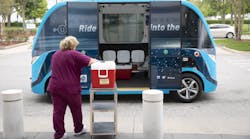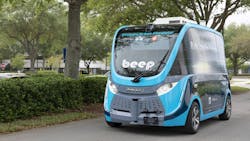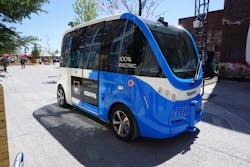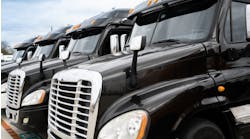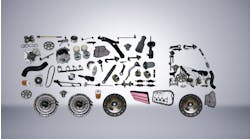In partnership with the Jacksonville Transportation Authority (JTA), Beep and NAVYA, autonomous vehicles are being used to transport COVID-19 tests and medical supplies at a drive-thru testing location at the Mayo Clinic in Florida.
At the end of March, four autonomous vehicles began operating along an initial route, in full autonomous mode — without an engineer or any people onboard — along routes isolated from pedestrians, traffic and staff. The COVID-19 test samples are placed in secure containers before being loaded onto the shuttle.
“Along with our partners Beep, NAVYA and Mayo Clinic, we are leveraging our learnings from three years of testing autonomous vehicles through our Ultimate Urban Circulator program,” said JTA CEO Nathaniel Ford. “Our innovative team saw this as an opportunity to use technology to respond to this crisis in Northeast Florida and increase the safety of COVID-19 testing.”
“Using artificial intelligence enables us to protect staff from exposure to this contagious virus by using cutting edge autonomous vehicle technology, and frees up staff time that can be dedicated to direct treatment and care for patients,” said Kent Thielen, CEO of the Mayo Clinic in Florida. “We are grateful to JTA, Beep, and NAVYA for their partnership in these challenging times.”
Beep, an autonomous shuttle fleet service provider, used Eagle Express Inc. to transport the shuttles from Lake Nona, Fla., an innovation hub 150 miles from the company headquarters in Orlando.
An additional shuttle is being utilized from the JTA’s Ultimate Urban Circulator program, which has tested AV technology since 2017 to prepare for conversion and expansion of its downtown Jacksonville network powered by autonomous vehicles.
The autonomous shuttle from NAVYA, as seen at the 2019 Movin’On Summit in Montreal, was specifically designed to meet the needs of an autonomous, driverless vehicle while also optimizing navigation and safety features. With neither a steering wheel nor pedals, NAVYA’s shuttle uses effective guidance and detection systems that combine various types of advanced technology: Data from Lidar sensors, cameras, GPS RTK, IMU and odometry is merged together and interpreted by deep learning programs.
“The opportunity to work together with these organizations in an effort to provide a dedicated COVID-19 testing solution represents our goal as a company,” said Étienne Hermite, CEO of NAVYA. “And that’s to create a more accessible solution in the moments that matter, whether that be crisis, shortage in manpower and resources, or other areas we can provide aid in.”
